Thecus N2560: Intel's EvanSport NAS Platform Review
by Ganesh T S on November 25, 2013 3:30 PM ESTCIFS Performance Evaluation
Evaluating the N2560 was fairly straightforward. We only needed to check up on CIFS performance (as both NFS and iSCSI are not supported). The unit was configured with two WD4000FYYZ (WD RE) 4 TB drives in RAID-1 configuration. From the outside, it looks like it would be ideal to compare the performance of this unit with that of the ReadyNAS 312 we reviewed a couple of weeks back. Unfortunately, the presence of two GbE ports on the RN312, as well as business targeted feature set puts it in a different class. As such, we can compare with other ARM-based 2-bay units. The Synology DS213 is one such unit that we have evaluated before in the form of the ioSafe N2.
Single Client (Windows) Mode:
The single client CIFS performance of the Thecus N2560 was evaluated on the Windows platforms using Intel NASPT and our standard robocopy benchmark. This was run from one of the virtual machines in our NAS testbed. All data for the robocopy benchmark on the client side was put in a RAM disk (created using OSFMount) to ensure that the client's storage system shortcomings wouldn't affect the benchmark results
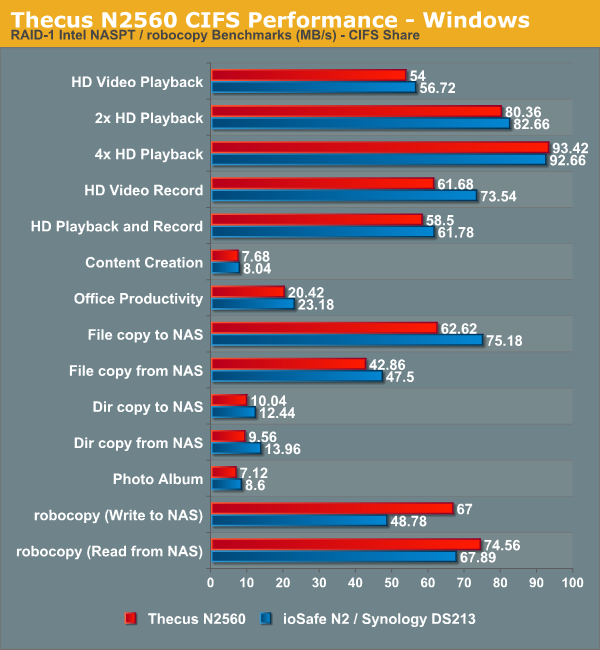
We find that the ARM-based ioSafe N2 / Synology DS213 performs better than the Thecus N2560 in a majority of the tests. However, the robocopy benchmarks (more representative of home users copying lots of files to and from the NAS) land in favour of the Thecus N2560. I would say that, based on performance alone, the Thecus N2560 will run neck-and-neck with the modern ARM-baed 2-bay units such as the Synology DS213.
Multi-Client (Windows) Mode:
We put the Thecus N2560 through some IOMeter tests with a CIFS share being accessed from up to 25 VMs simultaneously. The following four graphs show the total available bandwidth and the average response time while being subject to different types of workloads through IOMeter. IOMeter also reports various other metrics of interest such as maximum response time, read and write IOPS, separate read and write bandwidth figures etc.. Readers interested in the actual values can refer to our evaluation metrics table available here.
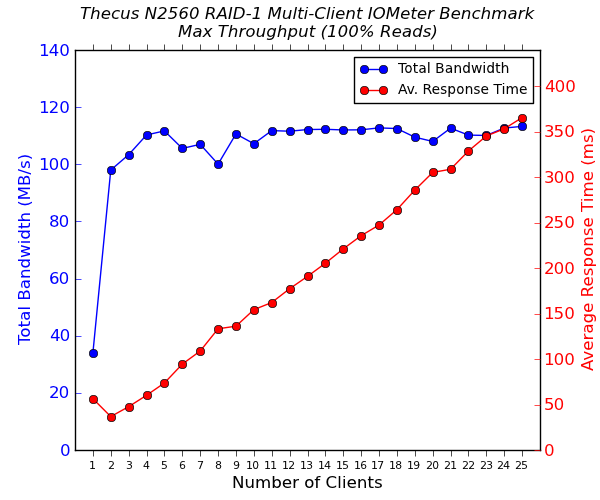
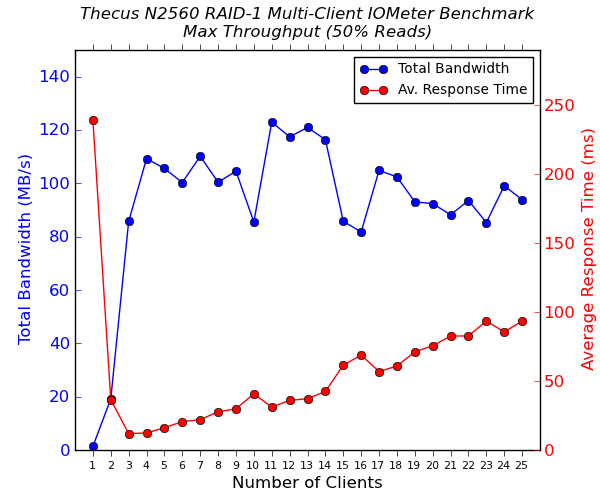
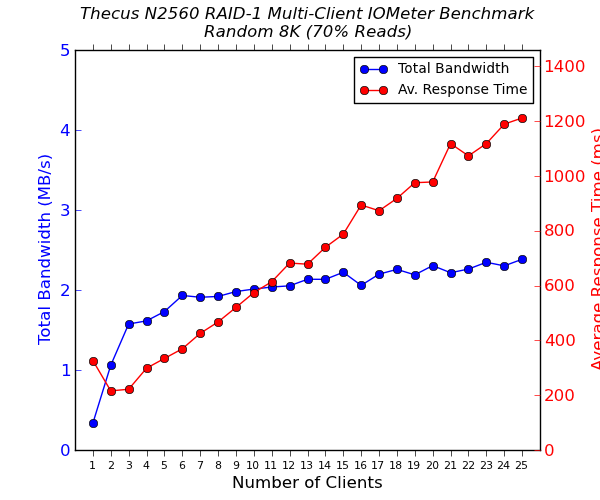
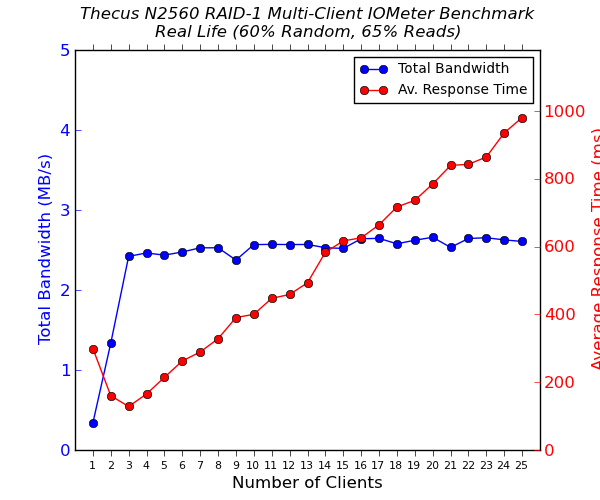
Comparing these graphs with what we obtained for the ioSafe N2 / Synology DS213, it can be inferred that the Thecus N2560 manages to maintain performance even as the number of clients connected to it keeps increasing. For the Synology DS213, we saw a dip in performance after more than 10 clients started connecting to it. The Thecus N2560 also manages to get consistently better average response times in various tests (for the same number of clients). However, it is not clear whether the average home consumer will have more than 10 clients simultaneously accessing data on the NAS. In that case, the choice may come down to non-performance aspects.










73 Comments
View All Comments
SeeManRun - Monday, November 25, 2013 - link
I do not understand why someone would buy a NAS with only 2 bays. They keep making these products, so obviously people are buying them, but if you are technically savvy enough to know you need a NAS, wouldn't you want one with more bays?I have been toying with building my own, and I could not bother for less than 6 drives in a RAID 5 solution.
brucek2 - Monday, November 25, 2013 - link
I was wondering this exact thing. Plus, what's the marginal cost for an extra bay or two anyway? I'd expect the hard manufacturing costs for a 2 drive unit would be 80-90% of the 4 drive unit?kelstertx - Monday, November 25, 2013 - link
I agree too, but the thing that comes to mind in favor of a 2 bay over 4 bay is if you wanted separate arrays for redundancy. A 2 bay with Raid 0 for size, and a second 2 bay with the same config lets you do backups and upgrade arrays as drive sizes get more affordable -- without having to wipe out your only array of data. Nice NAS boxes should allow addition of more drives and automatic resize for you, but this one can't even rebuild its own array from a failed drive in Raid 1, so it probably can't be trusted to resize either. So if basic storage was reliable, a pair of 2 bay boxes gets around the issue of trusting advanced things like recovery and resizing. Just guessing tho... I'd still get a 4 bay myself.Integr8d - Monday, November 25, 2013 - link
Why not get a 4-bay and create two separate volumes for disks 0 and 1 and then 2 and 3? As far as I know, these are all software raid. I own an 8-bay Synology that uses no hardware for the storage math. And it's all resizable. So I'd think that RAID 0 on two volumes within the same box should be no problemo.The question on my mind is what RAID 0 even buys you in these systems. Unless you're running dual or quad Gig-E or 10Gig, what are you buying, besides a larger volume (and the added possibility of something going wanky)? I think that for the average user, four drives, with two each in RAID 1, makes more sense.
Morawka - Tuesday, November 26, 2013 - link
increased writes and read speeds on RAID 0 even with 2 drives..I myself would slap 2X 4GB drives in Raid 1. You wont get Double write but you would get double read speeds.
Minion4Hire - Tuesday, November 26, 2013 - link
You don't see read improvements in RAID1. Nothing tangible or useful anyhow. But that's what he's getting at; modern hard drives can saturate gigabit ethernet with sequential reads. There isn't really a need for RAID0.Doomtomb - Monday, December 2, 2013 - link
You'd slap 2x 4GB hard drives together? My flash drive has more space than that.vol7ron - Wednesday, December 4, 2013 - link
Pretty sure he meant TB, not GB, which is the norm with home-based NAS.ace240 - Monday, November 25, 2013 - link
You might expect that, but you'd be wrong. One example:DS213j (entry level Synology 2-bay NAS): $199
DS413j (entry level Synology 4-bay NAS): $379
brucek2 - Monday, November 25, 2013 - link
Those are retail prices to consumers. My question ran to, how much did Synology have to pay to include those two extra bays? My guess is, unless they upgraded the cpu / networking / other chipsets to support more simultaneous clients (which would not be a necessity for me), a unit built on the same platform as the 2 drive unit but just offering space for 2 more drives should not cost much more.